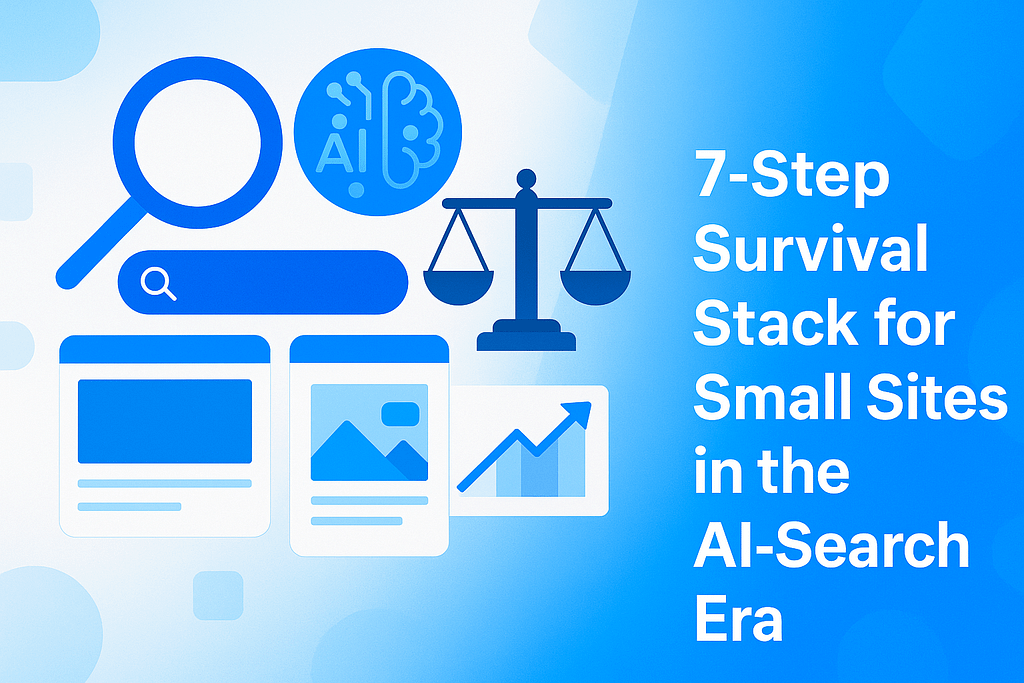
TL;DR: A federal judge found Google’s search business is an illegal monopoly but imposed limited remedies—no breakup—while ordering data-sharing and curbs on certain exclusive deals. Translation: the search landscape won’t radically change overnight, and AI Overviews will keep siphoning clicks, so creators and small publishers need a concrete plan to win attention off and beyond classic blue links. The Washington Post;The Verge;TechCrunch
What actually changed (plain English)
- No breakup of Alphabet/Google Search. Remedies focus on some data sharing and reducing exclusivity in default search arrangements—far short of what many hoped. The Washington PostThe Verge
- The court explicitly noted fast-moving AI competition (ChatGPT, Claude, etc.) as a reason to avoid structural remedies—meaning Google keeps room to evolve AI results quickly. The Verge
- For you? Don’t expect a traffic windfall from “new competition.” Clicks from Google are still harder to get when AI Overviews appear—studies show CTR on #1 results can drop ~34.5%. AhrefsEMARKETERDigital Content Next
The problem in one graph (why your posts get fewer clicks)
Recent analyses show that when an AI Overview is present, the average click-through rate for the top result drops (e.g., from ~7.3% to ~2.6% YoY on AI-Overview queries; various datasets show a similar ~34.5% decline). Your content can still rank—it just gets fewer clicks unless you package it for channels beyond the classic SERP. AhrefsEMARKETERDigital Content Next
The 7-Step Survival Stack (ship this in 14 days)
1) Publish one Pillar + five Support posts
Group your topic into a pillar page (the home base) and 5 supporting tutorials that all link back to it (top third + near the end). Use large images (≥1200px) and a clean TOC for Discover eligibility.
Internal links = oxygen now that AI snippets compress clicks.
(On CMMO, make your pillar “AI Affiliate Blueprint 2025,” then ship the five supports.)
2) Target KGR & “AI-resistant” formats
AI summaries handle definitions; they struggle with exact settings, checklists, price tables, and failure→fix stories. Your next five posts should be:
- A settings-screenshot SOP
- A 10-step checklist
- A “mistakes & fixes” case study
- A “tool A vs tool B” comparison table
- A 20-min quick-start mini-guide
(These outperform generic how-tos when AI Overviews sit above the fold.) Amsive
3) Turn every post into email growth
Add a mini lead magnet in-line (1-page PDF checklist). Put the form after the intro and again after the “What’s Next” section. When Google compresses clicks, own the relationship.
4) Ship Shorts from each post (and monetize them)
Spin 3–5 punchy Shorts (45–55s) per article. Add captions on-screen and a “full steps in bio” CTA that links to your pillar page. Ensure your channel has the Shorts Monetization Module accepted to revenue-share on eligible views. Google HelpStack Influence
5) Use Pinterest for top-of-funnel clicks (yes, affiliates are allowed)
Pinterest permits affiliate links (follow FTC disclosure + platform rules). Create 2 static pins + 1 Idea Pin per article, link either directly (where allowed) or to your post, and save to SEO-named boards. Pinterest CommunityShopify
6) Build “today-worthy” news hooks into evergreen posts
When rulings like this drop, add a timely intro box to relevant evergreen guides: “Updated after the Google antitrust decision (Sept 2025): here’s what we changed.” News peg = shares. The Washington Post
7) Measure beyond blue links
Track:
- Pillar impressions/clicks (Search Console)
- Shorts watch-through & subs gained per clip (YouTube) Google Help
- Pinterest outbound clicks per pin and saves over 7 days Pinterest Community
- Email: opt-in rate per article (aim 2–5%)
Copy-paste assets (use in your next post)
Quick Wins box (top of article):
- Download the 1-page checklist inside
- Watch the 53-second setup Short
- Grab the exact settings (screenshots)
End-of-post CTA:
Want the full workflow? Start with our AI Affiliate Blueprint (Zero-to-$100 Playbook)—templates, screenshots, and a 7-email welcome sequence you can copy today.
30-Day Publishing Checklist (stick on your monitor)
- Week 1: Publish pillar + 2 supports; 6 Shorts; 6 pins
- Week 2: Publish 2 supports; 6 Shorts; 6 pins
- Week 3: Update 2 older posts with a “Post-ruling” intro; 6 Shorts; 6 pins
- Week 4: Publish 1 case study (wins + mistakes); 4 Shorts; 6 pins
FAQ
Will the ruling give me more Google traffic by itself?
Unlikely in the short term. Remedies are modest, and AI results continue to compress clicks. Plan for multi-channel discovery. The Washington Post;The Verge
So what’s the single highest-leverage move?
A pillar + cluster built with AI-resistant formats (settings screenshots, checklists, comparisons) and email capture on every page—then distribute via Shorts and Pinterest. Amsive;Google Help;Pinterest Community
Do I need to change my SEO plugin or theme?
No.
Focus on structure and packaging: big images, TOC, internal links, skim-friendly sections, and clear CTAs.
Sources & further reading
- Judge Mehta’s remedies: limited, data-sharing-focused; no breakup. The Washington Post;The Verge;TechCrunch
- AI Overviews reduce clicks to results (~34.5% drop in CTR): Ahrefs, DCN, eMarketer. Ahrefs;Digital Content Next;EMARKETER
- YouTube Shorts monetization: official policy. Google Help
- Pinterest affiliate links: official community guidance + practical overview. Pinterest Community;Shopify